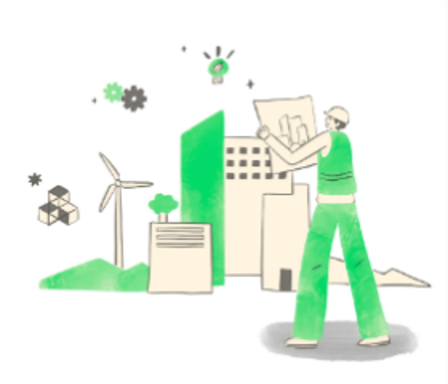|
What to know before starting?
What to know before starting? 
What will you learn?
 Identify the benefits of adopting green practices in the workplace and society. Identify the benefits of adopting green practices in the workplace and society.
 Develop strategies to reduce waste generation and promote circular economy practices Develop strategies to reduce waste generation and promote circular economy practices
 Identify opportunities to integrate green skills into existing professional roles. Identify opportunities to integrate green skills into existing professional roles.
How much time will it take?
 30 minutes 30 minutes
EQF level
Level 3
Who created the content and will recognise your learning?
This material was created by the partners of the Erasmus+ project “Upskilling Rural” that will recognise your learning as well.
Let’s start... but first think 
Let’s start... but first think
What comes to your mind when you read “green skills”?
What are “green skills”?
What are “green skills”? 
|
DEFINITION: green skills are the knowledge, abilities, values and attitudes needed to live in, develop and support a sustainable and resource-efficient society - United Nations Industrial Development Organization (UNIDO)
Green skills are divided into:
Hard skills – technical knowledge in specific areas (example: renewable energy, environmental monitoring, energy efficiency)
Soft/Power skills – personal attributes that enable someone to interact effectively with others (ex. critical thinking, problem solving, collaboration, etc.)
|
 |
| Skills to promote sustainability initiatives effectively |
|
The concept of sustainability 
The concept of sustainability is a broad concept based on 3 interconnected principles:
- Environmental sustainability – preserve and protect the natural resources, ensuring they are available for the future.
Actions: reduce emissions, sustainable agriculture, raising awareness, promote circular economy.
- Economic sustainability – the aim is to create a balance between economic development, responsible resource use and social equity.
Actions: responsible management of resources, financial stability, etc.
- Social sustainability – promote well-being of people and communities for inclusive societies and long-term well-being for all
Actions: promotion of inclusive practices, mental and physical health, safer living environments
Sustainability is about meeting the needs of the present allowing future generations to meet their own.
Green skill
Green skill 1 – Eco Tourism Development 
It includes:
Design and manage initiatives that minimise ecological impact.
How to do it?
- Promote low impact practices like limit group size, chose an environmental friendly transport when possible, minimise waste generation. It is important to promote responsible behaviour and encourage citizen participation.
- Preserve cultural heritage including responsible approach to local areas (traditions, customs, habits), promoting awareness on local heritage sites, support local businesses.
Think: eco tourism is not “one size fit all”, you need to look at your local area and identify actions and practices to promote sustainability and local development.
Green skill 2 – Entrepreneurship and local business development 
Empowering local communities and reinforce their business is a key skill for a rural manager.
How to do it?
- Supporting local businesses - encouraging participation and open mindness of locals, providing marketing and strategies to reach wider audience, connecting local businesses together for mutual benefit
- Enhancing hospitality of rural centres – promote citizen engagement through initiatives that improve communication skills and cultural awareness among communities and encouraging digital skills development.
- Fostering collaborations and networks - Developing collaborative approaches and collaborative spirit among businesses and locals for the development of their local communities
Green skill 3 – Eco - Design 
Eco-Design = design for sustainability with the aim to minimize environmental impact. It involves considering the environmental footprint of every stage and making conscious choices to reduce resource consumption, waste generation, and pollution.
How to do it?
- Focus on durability and Reusability – Design programmes and initiatives that can be easily adaptable and can be developed in the long time.
- Communicate Sustainability Efforts - Inform your customers about your eco-design practices and commitment to sustainability. This builds trust and encourages eco-conscious consumer behavior.
- Partner with Local Businesses: Collaborate with other eco-conscious businesses in the area to create a network that promotes sustainability within the rural community.
Sources
Sources 
|






 Play Audio
Play Audio 




 Identify the benefits of adopting green practices in the workplace and society.
Identify the benefits of adopting green practices in the workplace and society.  30 minutes
30 minutes


